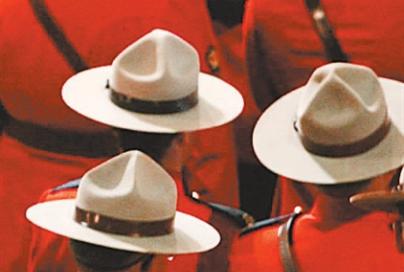[The following story appeared with The Mounting Mountie misconduct by Brian Hutchinson in the National Post on Dec. 12, 2009.]
What does the force do
with a wayward Mountie?
In many cases, 10 days without pay
and it’s back to work
Brian Hutchinson, National Post, Dec. 12, 2009
Photo: Shaun Best, Reuters Files
One October night in 2007, Michaelle Jean, her husband, Jean-Daniel Lafond, and their young daughter, Marie-Eden, were at ease inside Rideau Hall. An RCMP officer was on duty to protect the Governor-General and her family from unwelcome intrusion or threat.
A lone RCMP sentry for Rideau Hall might seem too modest, given that he is responsible for safeguarding the Queen’s representative in Canada, the Commander-in-Chief of this country’s armed forces.
Constable Guy Jacques seemed to think not. An hour before midnight, not two hours into his shift, he abandoned his post and left the Governor-General and her family without a security presence, the National Post has learned.
Const. Jacques drove off in an RCMP minivan. He went to play hockey. He then drove to a cemetery. Later, he disrupted a Gatineau Police Service surveillance and search operation by driving through a targeted area “about 20 times” in his RCMP minivan.
After playing shinny and joyriding through the National Capital Region for six hours, Const. Jacques returned to guard Rideau Hall. He was eventually found out and in April this year, he was docked five days pay.
Whether it is abandoning a post, being caught masturbating in a police vehicle while on surveillance duty, fabricating notes from a crime scene or drunk driving, any number of infractions by RCMP officers result in no more than being docked a few days pay.
There are dozens of such examples. The National Post obtained this week 84 RCMP adjudication board decisions rendered across Canada since January 2008. Adjudication boards are internal RCMP tribunals that determine sanctions in cases of proven misconduct. Only a handful of the 84 decisions resulted in discipline more severe than forfeiture of pay.
In fact, the maximum forfeiture of pay per infraction, under the federal RCMP Act, is 10 days. Offending Mounties can be demoted; however, this applies only to some ranks above constable. Inspectors, for example, cannot be demoted, according to the Act.
The Act makes no specific mention of appropriate sanction for officers convicted in court of a criminal offence. An officer who commits a crime and is convicted may receive only light internal discipline.
RCMP officers seldom receive stiff internal sanctions, even for serious transgressions including criminal acts. Officers found guilty of misconduct are very rarely fired, something that RCMP Commissioner William Elliott complained about in an interview last month with the Edmonton Journal. He seemed to blame the federal RCMP Act, passed into law in 1985. But according to the wording of the Act, the bar for dismissal does not seem to be too high.
According to the Act, “Any officer may be recommended for discharge or demotion and any other member may be discharged or demoted on the ground, in this Part referred to as the ‘ground of unsuitability’, that the officer or member has repeatedly failed to perform the officer’s or member’s duties under this Act in a manner fitted to the requirements of the officer’s or member’s position, notwithstanding that the officer or member has been given reasonable assistance, guidance and supervision in an attempt to improve the performance of those duties.”
Mr. Elliott has not responded to repeated requests that he clarify his remarks from last month. The public is left to wonder what the problem really is.
“The [RCMP] brass always tell me they don’t want these guys in their midst, but they don’t seem to act upon their sentiments,” says Robert Gordon, director of Simon Fraser University’s School of Criminology in Burnaby, B.C. “Is it because of the Act, or something else?”
Certainly the adjudication decisions show that some officers receive only minimal disciplinary action.
For example, Constable Michael Dudas pleaded guilty in Ontario Provincial Court to a charge of common assault in 2007. In what an RCMP adjudication board later described as “a sudden and violent” attack, Const. Dudas punched a young woman in the face.
She fell to the ground and lay there, bleeding profusely.
“Death could easily have resulted from the severity of the blow,” the adjudication board determined. The young woman suffered cuts and other injuries, including four fractured teeth. To make matters worse, Const. Dudas left the scene without offering his victim any assistance.
His internal sanction: Forfeiture of 10 days pay — the Act’s maximum.
“While holding Constable Dudas strictly to account for his actions, the Board also recognizes Constable Dudas as a valuable resource and foresees a promising career for this member,” the June, 2008 adjudication board decision reads.
In the unusual event that an officer is ordered dismissed by an adjudication board, a lengthy appeal process can then ensue.
It was determined in January that a constable sexually assaulted an unconscious, drugged woman at a house party near Vancouver. The sexual assault happened in 2005.
The constable was suspended but he continues to receive his regular RCMP paycheque, pending the outcome of his dismissal appeal.
